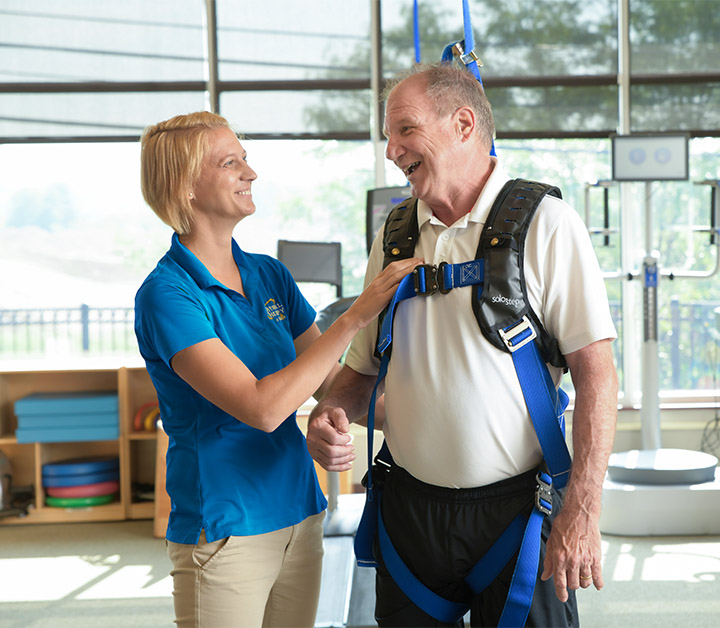Neurologic Rehab
Learn how your brain and body connect to improve movement, memory, cognitive, communication, and swallowing difficulties.
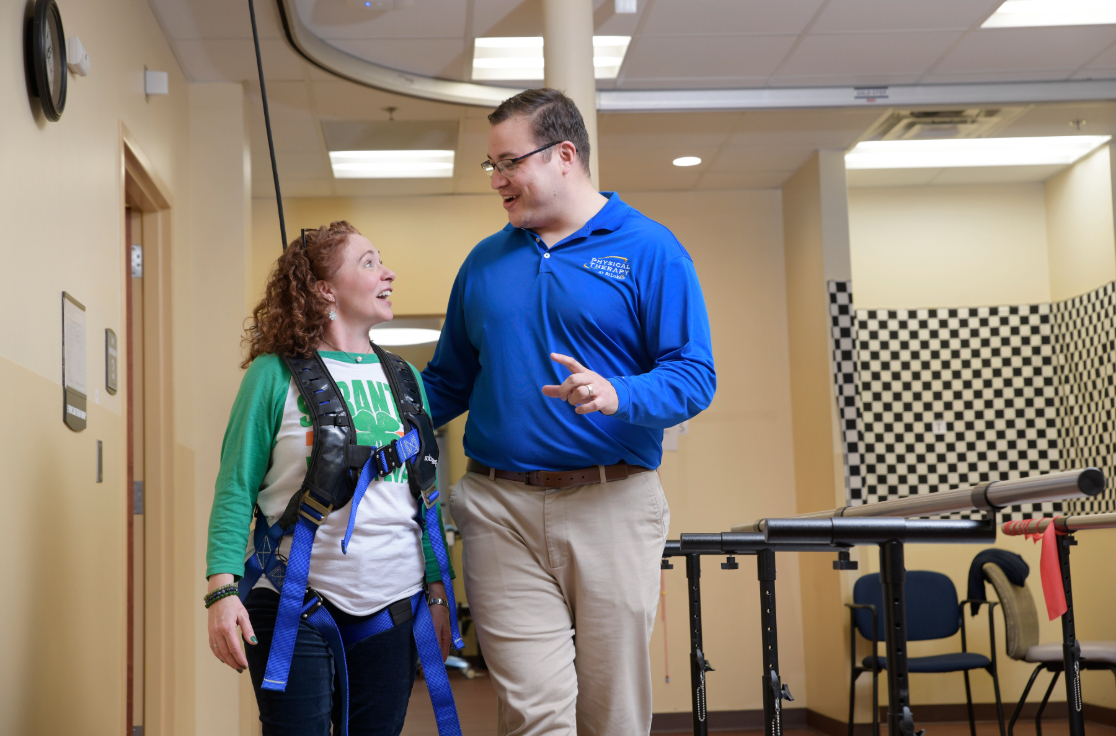
Personalized rehabilitation
Whether you’re facing movement issues, memory loss, communication difficulties, or swallowing problems, our specialized team is here to guide you towards long-term health benefits. We’ll provide you with a personalized rehabilitation program tailored to your individual needs and abilities, assisting you every step of the way.
Neurologic Rehab Programs
Amputee Program
A patient-centered, multidisciplinary program focused on maximizing functional independence and improving quality of life. Therapy can be initiated pre or post amputation as needed. The rehabilitation team includes highly experienced physical and occupational therapists, a multitude of prosthetic vendors and prosthetists, and specialized doctors who work towards providing superior, quality care to all patients.
Periprosthetic therapy can be initiated prior to getting the prosthesis and then continued through the prosthetic training phase. Plan of cares vary based on the person from 2 to 4 times a week as needed.
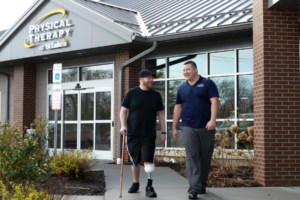
Program highlights:
- Transfer, balance, and gait training
- Home safety evaluations/cognitive assessments
- Self-care and homemaking retraining including personal prosthetic management
- Phantom limb syndrome and residual limb desensitization
- Fall prevention
- Psychosocial interventions for body acceptance, depression, and/or anxiety needs
- Detailed exercise program to improve strength, endurance, and balance
- Individualized prosthetic training and continual assessments to optimize fit
- Interdisciplinary communication with Prosthetists, Primary Physician, & Physiatrist
- Community re-entry & return to work
Concussion Rehabilitation
Physical Therapy at St. Luke’s treats patients who have had a concussion with a team-based approach for rehabilitation. The program begins with physical therapists completing evidence-based testing to determine a patient’s impairment profile which drives their specific post concussive treatment and determine a patient-centered plan of care.
Our team-based approach prioritizes returning patients to normal participation in life, work, school, and sports related activities safety as soon as possible.
Assessment and Intervention includes:
- Education on concussion and safe return to activity
- Vestibular assessment and exercise
- Oculomotor assessment and treatment
- Cervical assessment and treatment
- Physical tolerance and aerobic exercise
- Balance assessment and exercise
- Return to work needs and preparation
- Return to play protocols
- Cognition assessment and rehabilitation

Fitness to Drive
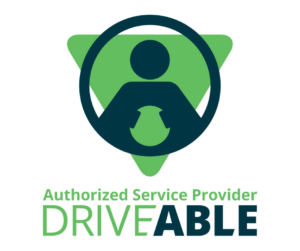
Physical Therapy at St. Luke’s offers the Fitness to Drive Program at several convenient locations. We have partnered with DriveABLE and perform 4 computerized tasks that measure the cognitive processes needed for safe driving and predict actual on-road performance.
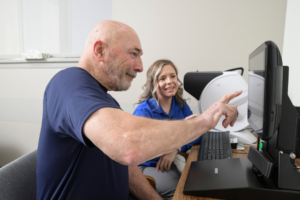
Areas that may be tested include:
- Reaction time
- Visual spatial skills
- Memory
- Motor control
- Sustained and divided attention
- Rapid walk test
- Vision screen with OPTEC 5000
- Brake reaction timing
- Range of motion
- Strength
Occupational Therapists and Physicians collaborate to determine individuals’ capability to drive safely based on their current skills. Individuals will be contacted with their results by their Physician.
We offer out Fitness to Drive Program at the following locations:
Memory Care Program
Physical Therapy at St. Luke’s offers memory care for individuals who experience changes in thinking skills due to age or neurological event. Our Occupational and Speech Therapy clinicians work to evaluate and create a custom treatment plan to learn how to manage these challenges and work to restore skills. Due to events such as a stoke, traumatic brain injury or neurologic diagnoses (i.e., Parkinson’s disease or Multiple Sclerosis), you may experience difficulties with short term memory, word finding, attention, thought processing and problem solving.

Treatment Services Available:
- Interactive Metronome (IM): IM is a computerized program which reflects in milliseconds, the individual’s ability to perform simple motor movements in response to a beat. It is designed to improve motor planning, sequencing, language processing and higher-level cognitive functions.
- Bioness Integrated Therapy System (BITS): BITS is an interactive touchscreen with programs to challenge individuals through the use of visual motor activities, visual and auditory processing, cognitive skills, and endurance training.
- Fitness to Drive Evaluation: Physical Therapy at St. Luke’s offers our Fitness to Drive program at various locations within the network. We have partnered with DriveAble to help measure the skills needed for safe driving and predict actual on-road performance for our patients. Our clinicians use a touch-screen computer system to complete the testing.
Areas that are tested include:
- Motor speed and control
- Spatial awareness and decision making
- Attention shifting and speed
- Reaction time
- Decision making in real-life driving situations
- ROM and strength
Following the computer-based testing, the Occupational Therapist and Physician collaborate to determine a patient’s ability to drive safely and discuss the next course of action. The patient may then be referred to ongoing therapy to address cognitive changes or be referred to another program for on the road driver’s rehabilitation.
Dementia Care: Dementia is a neurological condition that causes memory loss and other thinking problems that worsen over time. Our Occupational Therapy and Speech Therapy team can help! The goal of treatment is to maintain quality of life of the individual with dementia for as long as possible as well as provide caregiver education.
Our clinicians can help an individual with dementia stay as independent as possible. Speech therapy may work on attention, memory, problem solving, and higher-level thinking skills through the creation of a memory book and therapeutic exercises. Occupational therapy can address activities of daily living, such as dressing, bathing, cooking, managing medications, leisure activities, money management, and driving safety.
Multiple Sclerosis Program
Our multidisciplinary program develops customized plans focused on treating you as a whole person. As you journey through the challenges of Multiple Sclerosis, we will work with you and your family to reach your maximal level of independence and help you with your own personal goals in therapy.
Devices and Equipment used:
- Saebo
- Bioness Integrated Therapy System
- IOPI
- Interactive Metronome
- Vital Stim Plus
- Treadmills
- Biodex Balance System SD
- SoloStep
- Virtualis
- Appropriate Assistive Devices
Physical Therapy
Our team will work to maximize your independence with walking, reducing the risk of falls as well as fatigue management. Our Physical Therapists can also help address other challenges such dizziness, muscular tightness, energy conversion techniques, as well as creating a comprehensive team approach for disease management.
PT can help:
- Drive up your heart rate safely, helping patients progress further in their abilities and exercise tolerance with interval training
- Retrain and maintain the brain to make faster, new connections, leading to prolonged levels of function and relapse management
- Provide effective and research-based information for those who have just been diagnosed or have been managing the disease for years
- Provide beneficial information or treatment plans for those who have already had PT in the past for Multiple Sclerosis Management
- Provide therapy 2 days per week for an hour by a specialty-trained physical therapist
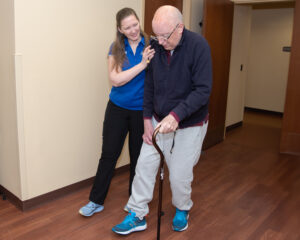
Occupational Therapy
Our Occupational Therapists will assess the impact of changes in sensation, motor function, coordination, cognition/memory, and visual perception on your ability to manage life tasks, roles, and meaningful activities.
The OT team will work to maximize your independence by:
- Restoring your functional skills needed to continue to complete daily tasks
- Restoring personal self-care and leisure activities
- Enhancing the abilities of arm and hand function, as well as any potential vision, cognitive, ore memory challenges one encounters
- Improving functional use of the affected areas of the body when completing feeding, dressing, and bathing tasks

Speech Therapy
- Speech: Our Speech Therapy team can evaluate you for changes in your speech or language with an MS diagnosis. You may experience slurred speech, known as dysarthria.
- Swallowing: Our trained Speech-Language Pathologists can evaluate your swallowing abilities to provide recommendations for the safest diet as well as provide education on safe swallowing strategies. Swallowing therapy may also be recommended to strengthen your swallowing muscles to allow you to eat safely.
- Cognition: Our trained Speech-Language Pathologists can evaluate if you are experiencing difficulties with short term memory, word finding, attention, thought processing and problem solving. Our SLP’s provide an individualized treatment plan to increase participation in meaningful activities, facilitate overall improved quality of life, and reduce caregiver burden.

Parkinson’s Treatment
Our multidisciplinary programs are focused on treating you as a whole person. As you fight your disease, we work with you to reach your maximal level of function and help you with your own personal goals in therapy. Some of the goals we may be addressing include difficulties with balance, mobility, memory, swallowing and changes in your speech or voice.
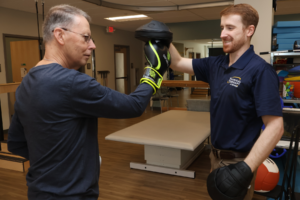
Community Groups:
- PD Steps
- Rock Steady Boxing
- Parkinson’s Movement Hour
Individual Programs:
- LSVT LOUD
- Speak Out
- Swallowing
Certain exercises may slow the disease progression; we will guide you in finding that program. Some options of specific programs we offer:
- Rock Steady Boxing
- Boxing for Parkinson’s
- LSVT BIG
Occupational Therapy
Our therapists target the cognitive, behavioral, sensory, and motor processing systems that impact functionality for those experiencing impairments with the central nervous system. Our goal is to help patients achieve optimum function, mobility, and independence. Occupational therapy can improve your performance in daily activities, arm, and hand function, as well as visual perceptual skills.
Conditions treated by Neurological Occupational Therapy include:
- Multiple Sclerosis (MS)
- Amyotrophic Lateral Sclerosis (ALS)
- Brain Tumors
- Spinal Cord Injury (SCI)
- Stoke
- Parkinson’s Disease
- Concussion
- Traumatic Brain Injury (TBI)

Speech Therapy
Physical Therapy at St. Luke’s offers speech, swallow, and communication-based therapies that can help treat a wide variety of conditions. Our team of speech-language pathologists and audiologists are experienced in improving communication for patients of all ages.
Speech-language pathologists (SLP) diagnose and treat communication and swallowing disorders in children and adults. The difficulties that one experiences may be a result of neurological disorders, developmental disabilities, learning disabilities, physical problems, voice pathology, hearing impairments, and emotional disorders.
Common conditions treated:
- Difficulty producing sounds clearly
- Stuttering or other fluency disorders
- Voice disorders
- Difficulty producing or understanding language
- Feeding and/or swallowing difficulty
- Memory difficulties
- Word finding difficulties

Stroke Program
Our multidisciplinary programs develop customized plans focused on treating you as a whole person. As you recover from a stroke, we work with you and your family to reach your maximal level of independence and help you with your own personal goals in therapy.
Devices and equipment used:
- Saebo
- Bioness Integrated Therapy System
- Vital Stim Plus
- Treadmills
- Biodex Balance System SD
- SoloStep
- Virtualis
- IOPI
- Appropriate Assistive Devices
Physical Therapy
Our team will work to maximize your independence with walking and reduce the risk of falls. The PT team will utilize High-Intensity Gait Training, or HIGT. This therapy is proven to fuel quicker, more thorough recovery after stroke, leading to further improvements with walking speed, distance, balance, and endurance. Details:
- drive up heart rate safely, helping patients progress further in their abilities post stroke
- helps to retrain the brain to make faster new connections, leading to quicker progress in stroke recovery
- is effective for those who have just sustained a stroke and those who are several years post stroke
- is beneficial for those who have already had physical therapy following a stroke
- is provided 3-4 days per week for an hour by specialty-trained physical therapists
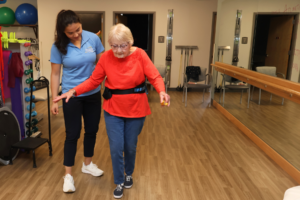
Occupational Therapy
Occupational Therapists will assess the impact of changes in sensation, motor function, coordination, cognition/memory, and visual perception on your ability to manage life tasks, roles, and meaningful activities. The OT team will work to maximize your independence by:
- restore functional skills needed to continue to complete daily tasks
- restore personal self-care and leisure activities
- focus especially on enhancing the abilities of arm and hand function
- improve functional use of the affected upper extremity when completing feeding, dressing, bathing tasks
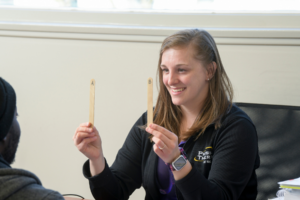
Speech Therapy
- Speech and Language: Our speech therapy team can evaluate you for changes in your speech or language after a stroke. You may experience slurred speech, known as dysarthria, or suffer from aphasia, a language disorder affecting your ability to speak, write, read, and listen.
- Swallowing: Our trained speech-language pathologists can evaluate your swallowing abilities to provide recommendations for the safest diet as well as provide education on safe swallowing strategies. Swallowing therapy may also be recommended to strengthen your swallowing muscles to allow you to eat safely.

Vestibular & Fall Prevention
What is a Vestibular Disorder?
The disorder develops when the vestibular system, made up of the inner ear and brain (which help control balance and eye movements) is damaged by disease, aging, or injury.
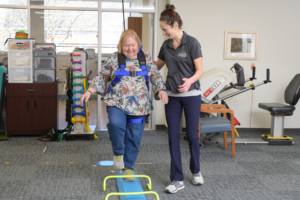
Benefits of Vestibular Therapy:
- Decreasing the risk of falling
- Decreasing intensity and/ or episodes of vertigo/dizziness
- Improving balance and ambulation
- Improving eye-hand coordination
- Improve overall endurance and muscle strengthening
- Substitution and coping skills
Vestibular Therapy can Treat:
- Abnormal Gait
- Multiple Sclerosis
- Acoustic Neuroma
- Parkinson’s Disease
- Benign Paroxysmal Positional Vertigo (BPPV)
- Post-Concussion Syndrome
- Labyrinthitis
- Vestibular Neuritis
- Migraine Related Motion Sickness
- Vestibular Weakness
- Mild Traumatic Brain Injury
Voice Therapy Program
Our speech therapy team provides evaluation and treatment of a variety of voice disorders. Voice therapy provides individuals with voice disorders training on ways to change their vocal behaviors to heal their vocal cords.
Voice disorders can impact the quality, pitch, or loudness of voice production. Those with voice disorders may sound strained, hoarse, or weak. Voice therapy can help individuals recover their voices from training on voice strengthening exercises by a speech therapist.
Some therapists on our staff have a background in the performing arts to help target specific goals related to the singing voice for musicians with vocal pathologies (e.g., vocal fatigue, muscle tension dysphonia, vocal nodules, etc.). We also offer voice therapy for individuals who are transgender and may benefit from gender-affirming voice therapy.

Voice Therapies Offered:
- Lee Silverman Voice Therapy (LSVT LOUD®) trains individuals with Parkinson’s disease (PD) and other neurological conditions to use their voices at a more normal loudness level when speaking at home, work, or in the community.
- SPEAK OUT!, which was developed by The Parkinson’s Voice Project, targets vocal strengthening exercises and trains individuals with PD to transition automatic functions to intentional acts. With “INTENT,” speaking, swallowing, walking, writing, and other motor movements can improve as well.
- Myofascial Release (MFR) for voice and swallowing disorders is a form of manual therapy that involves applying gentle and sustained pressure into the fascial tissue (i.e., connective tissue) to eliminate pain and improve range of motion.
- Phonation Resistance Training Exercises (PhoRTE) is voice therapy for pathologic age-related voice changes (i.e., presbyphonia) that occur in older adults. PhoRTE uses high intensity vocal exercise to systematically rehabilitate the vocal mechanism and improve vocal endurance.
- Lessac-Madsen Resonant Voice Therapy (LMRVT) and Casper-Stone Confidential Flow Therapy (CSCFT) are voice therapy programs developed with the goal to improve overall vocal quality, have a stronger voice, and to help prevent future injury. This is completed through a focus on voice care, a series of exercises with use of resonant voice, directing attention to sensory information in voice production, and facilitating the ability to use resonant voicing outside of the therapy room.
Our Neuro Locations:
Schedule an Appointment
Our experienced team at Physical Therapy at St. Luke's is here to help you on your journey to recovery and improved mobility.
Schedule